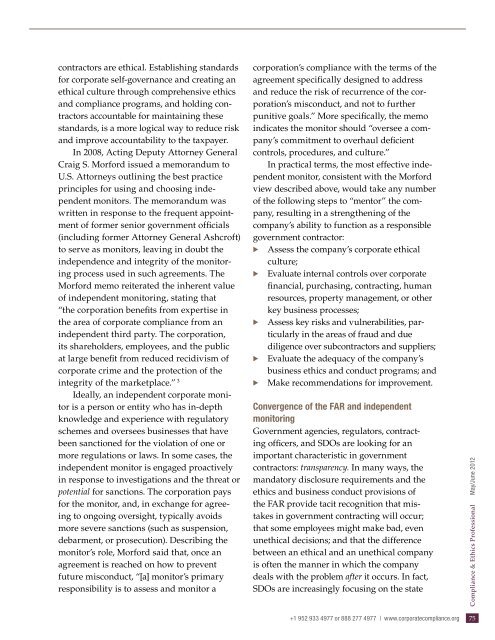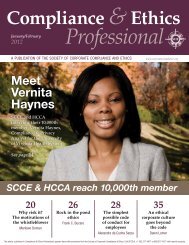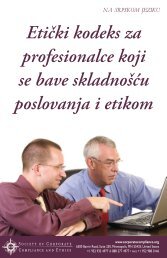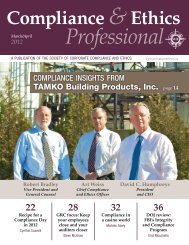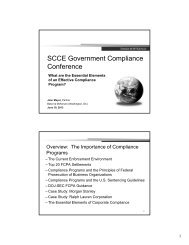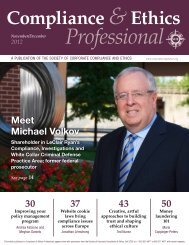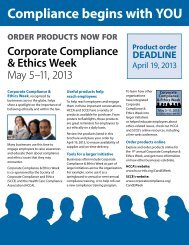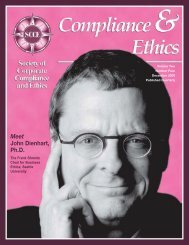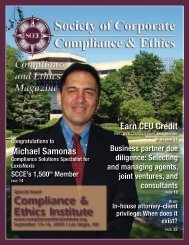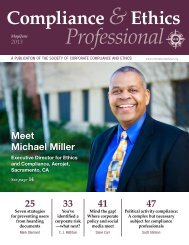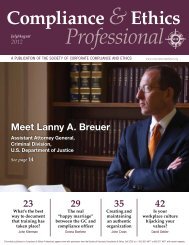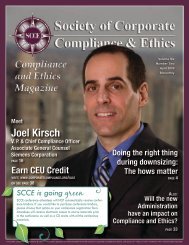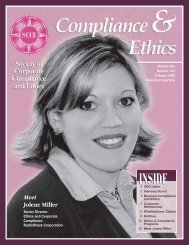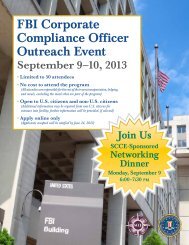Compliance &Ethics - Society of Corporate Compliance and Ethics
Compliance &Ethics - Society of Corporate Compliance and Ethics
Compliance &Ethics - Society of Corporate Compliance and Ethics
- No tags were found...
Create successful ePaper yourself
Turn your PDF publications into a flip-book with our unique Google optimized e-Paper software.
contractors are ethical. Establishing st<strong>and</strong>ardsfor corporate self-governance <strong>and</strong> creating anethical culture through comprehensive ethics<strong>and</strong> compliance programs, <strong>and</strong> holding contractorsaccountable for maintaining thesest<strong>and</strong>ards, is a more logical way to reduce risk<strong>and</strong> improve accountability to the taxpayer.In 2008, Acting Deputy Attorney GeneralCraig S. Morford issued a memor<strong>and</strong>um toU.S. Attorneys outlining the best practiceprinciples for using <strong>and</strong> choosing independentmonitors. The memor<strong>and</strong>um waswritten in response to the frequent appointment<strong>of</strong> former senior government <strong>of</strong>ficials(including former Attorney General Ashcr<strong>of</strong>t)to serve as monitors, leaving in doubt theindependence <strong>and</strong> integrity <strong>of</strong> the monitoringprocess used in such agreements. TheMorford memo reiterated the inherent value<strong>of</strong> independent monitoring, stating that“the corporation benefits from expertise inthe area <strong>of</strong> corporate compliance from anindependent third party. The corporation,its shareholders, employees, <strong>and</strong> the publicat large benefit from reduced recidivism <strong>of</strong>corporate crime <strong>and</strong> the protection <strong>of</strong> theintegrity <strong>of</strong> the marketplace.” 3Ideally, an independent corporate monitoris a person or entity who has in-depthknowledge <strong>and</strong> experience with regulatoryschemes <strong>and</strong> oversees businesses that havebeen sanctioned for the violation <strong>of</strong> one ormore regulations or laws. In some cases, theindependent monitor is engaged proactivelyin response to investigations <strong>and</strong> the threat orpotential for sanctions. The corporation paysfor the monitor, <strong>and</strong>, in exchange for agreeingto ongoing oversight, typically avoidsmore severe sanctions (such as suspension,debarment, or prosecution). Describing themonitor’s role, Morford said that, once anagreement is reached on how to preventfuture misconduct, “[a] monitor’s primaryresponsibility is to assess <strong>and</strong> monitor acorporation’s compliance with the terms <strong>of</strong> theagreement specifically designed to address<strong>and</strong> reduce the risk <strong>of</strong> recurrence <strong>of</strong> the corporation’smisconduct, <strong>and</strong> not to furtherpunitive goals.” More specifically, the memoindicates the monitor should “oversee a company’scommitment to overhaul deficientcontrols, procedures, <strong>and</strong> culture.”In practical terms, the most effective independentmonitor, consistent with the Morfordview described above, would take any number<strong>of</strong> the following steps to “mentor” the company,resulting in a strengthening <strong>of</strong> thecompany’s ability to function as a responsiblegovernment contractor:··Assess the company’s corporate ethicalculture;··Evaluate internal controls over corporatefinancial, purchasing, contracting, humanresources, property management, or otherkey business processes;··Assess key risks <strong>and</strong> vulnerabilities, particularlyin the areas <strong>of</strong> fraud <strong>and</strong> duediligence over subcontractors <strong>and</strong> suppliers;··Evaluate the adequacy <strong>of</strong> the company’sbusiness ethics <strong>and</strong> conduct programs; <strong>and</strong>··Make recommendations for improvement.Convergence <strong>of</strong> the FAR <strong>and</strong> independentmonitoringGovernment agencies, regulators, contracting<strong>of</strong>ficers, <strong>and</strong> SDOs are looking for animportant characteristic in governmentcontractors: transparency. In many ways, them<strong>and</strong>atory disclosure requirements <strong>and</strong> theethics <strong>and</strong> business conduct provisions <strong>of</strong>the FAR provide tacit recognition that mistakesin government contracting will occur;that some employees might make bad, evenunethical decisions; <strong>and</strong> that the differencebetween an ethical <strong>and</strong> an unethical companyis <strong>of</strong>ten the manner in which the companydeals with the problem after it occurs. In fact,SDOs are increasingly focusing on the state<strong>Compliance</strong> & <strong>Ethics</strong> Pr<strong>of</strong>essional May/June 2012+1 952 933 4977 or 888 277 4977 | www.corporatecompliance.org 75


